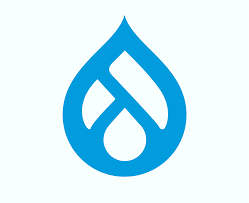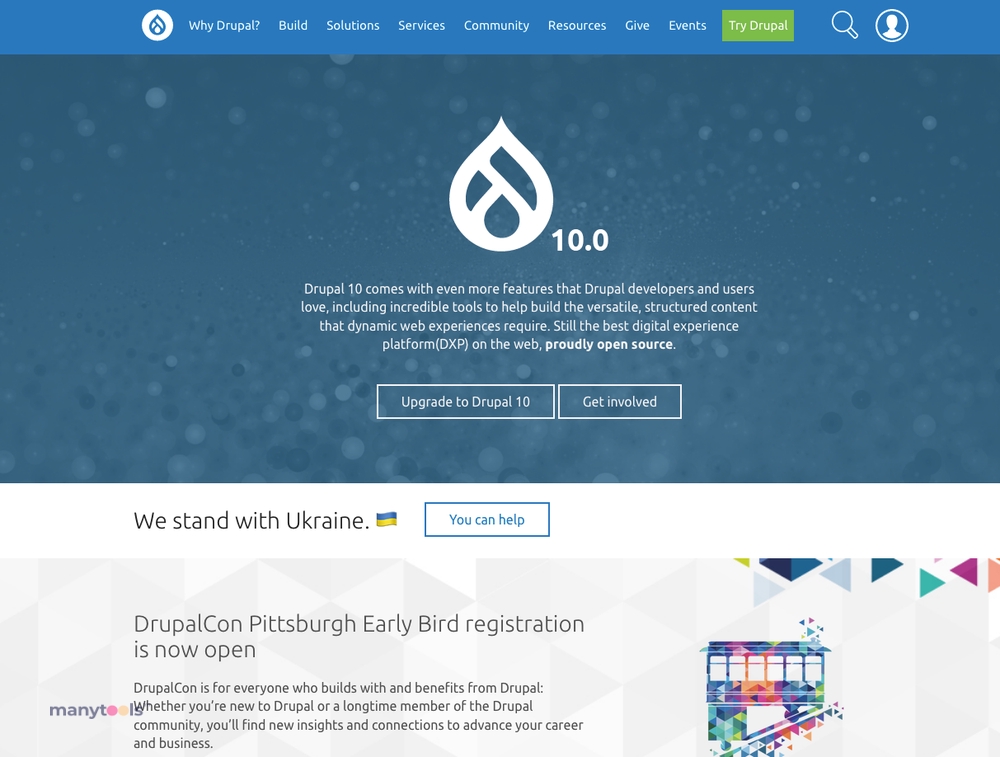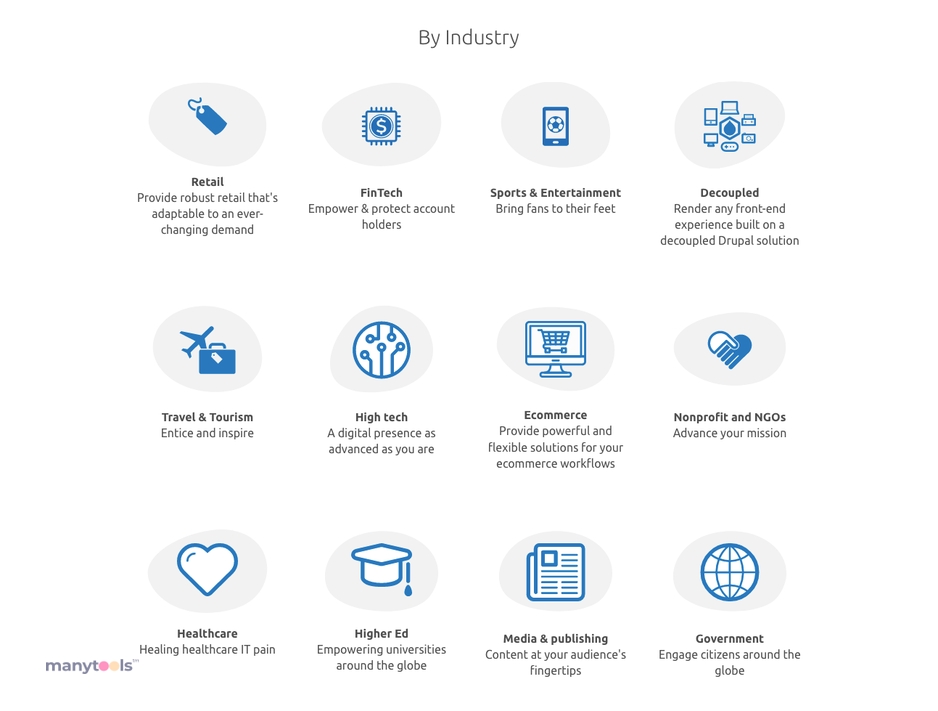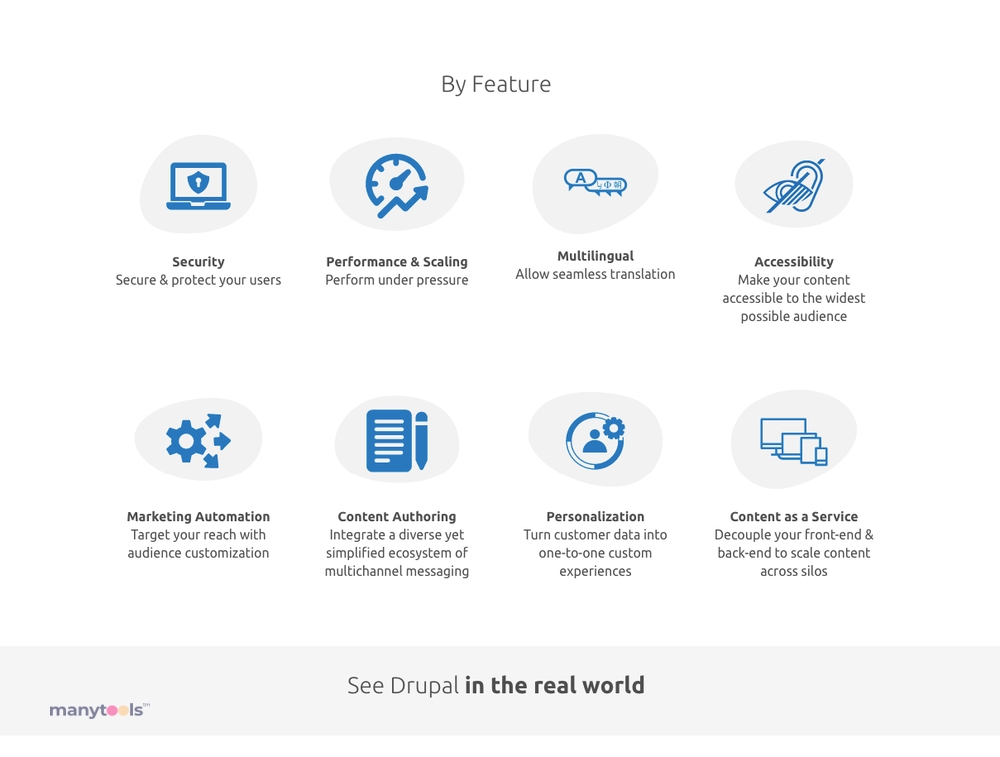


A Fresh Approach to Content Management
For every digital professional aware of the intricacies of website development, Drupal needs no introduction. However, its essence lies in its simplicity and intuitiveness. Primarily a content management software, Drupal goes beyond just creating websites. It equips you with the tools to construct versatile, organized content that outcomes in dynamic web experiences. It provides standard features renowned for their reliability, like smooth content authoring, excellent performance, and supreme security, it's at the heart of many of your cherished digital experiences. Drupal, with its innate flexibility and modularity, allows you to extend its use with a plethora of add-ons, modules for expanded functionality, themes for personalized content presentation, and distributions as packaged Drupal packages to kick-start your endeavors.
Liberating Creativity
When we delve further into Drupal's intricacies, it becomes evidently clear how its design liberates creative souls. Unlike the average content management system, Drupal does not restrict you to specific use cases. Instead, it gives you a spectrum of modular elements to create anything your imagination permits, from blogs and social networks to online stores and news sites. This blend of flexibility and simplicity is the reason why government agencies, universities, and media companies worldwide choose Drupal as their platform. So, whether you're a site builder looking to create a news site, online store, social network, blog, wiki, or anything else, it’s all about bringing the right modules together.
A Collaborative Ecosystem
Drupal is not just an open-source software but a collaborative ecosystem housing one of the largest open-source communities in the world. Over a million passionate developers, designers, strategists, coordinators, editors, and sponsors work together to propel the Drupal project forward. Moreover, Drupal 10 continues the tradition of constant innovation, making it the easiest upgrade in over a decade. The beauty of this project is that anyone can use, work on, and share it. The software is distributed under the General Public License (GPL), meaning there are no licensing fees. In essence, Drupal stays free forever.
Unwavering Commitment to Excellence
With Drupal, the journey from inception to execution is no sweat. You can comfortably set up a Drupal site and it will be running within an hour. You can select one of the included themes and hit the road by adding the desired content. Drupal's core values like collaboration, globalism, and innovation coupled with their commitment to providing an outstanding content management solution make Drupal an irresistible choice in the market. Whether it's performance under pressure, security for your users, multilingual capabilities, or personalization, Drupal stands tall, corroborating why it's the first choice for millions of websites and applications worldwide.
 Offers robust customization options through thousands of free modules and themes.
Offers robust customization options through thousands of free modules and themes.
 Adaptable for multilingual and globalized platforms.
Adaptable for multilingual and globalized platforms.
 Built on principles of accessibility, offering inclusive web experiences.
Built on principles of accessibility, offering inclusive web experiences.
 Provides excellent security and performance functionalities.
Provides excellent security and performance functionalities.
 Open source and free to use with no licensing fees.
Open source and free to use with no licensing fees.
 Large global community for support, collaboration, and innovation.
Large global community for support, collaboration, and innovation. Requires significant time investment to learn and master.
Requires significant time investment to learn and master.
 May pose a steep learning curve for non-technical individuals.
May pose a steep learning curve for non-technical individuals.
 Reliance on community for module development can lead to variability in quality.
Reliance on community for module development can lead to variability in quality.
 While installation is simple, customizing the CMS can be complex and cumbersome.
While installation is simple, customizing the CMS can be complex and cumbersome.
 Needs frequent updates for security and performance maintenance.
Needs frequent updates for security and performance maintenance.
 Relatively less beginner-friendly compared to other CMSs like WordPress.
Relatively less beginner-friendly compared to other CMSs like WordPress. Frequently Asked Questions
Find answers to the most asked questions below.
What is Drupal and what makes it unique?
Drupal is a free and open-source content management software used to make websites and applications. What makes Drupal unique is its flexibility; its modularity is one of its core principles. It has a toolset to help you build versatile, structured content needed for dynamic web experiences. Drupal can be extended with any one, or many, of thousands of add-ons. Its ability to integrate with external services and other applications in your infrastructure makes it unlike any other content management software.
What is the Drupal community and what role does it play?
The Drupal community is one of the largest open-source communities in the world, comprising over 1,000,000 passionate developers, designers, trainers, strategists, coordinators, editors, and sponsors. This community is responsible for building Drupal, providing support, creating documentation, sharing networking opportunities, and more. Their shared commitment to the open-source spirit propels the Drupal project forward.
Who uses Drupal and why?
Drupal is used by numerous government agencies, media companies, organizations, and universities to communicate, inform, entertain, and work towards making the world a better place. Examples include the United States government, BBC, NBC, MTV UK, Amnesty International, and the University of Oxford. These entities all depend on Drupal for its flexibility, modularity, security and its potential for integration and scalability.
What measures does Drupal take towards ensuring accessibility and multilingual capabilities?
Drupal is built with emphasis on accessibility and multilingual capabilities. It allows you to reach your target audience and convey your message more effectively. Desktop tools allow you to build a web application on your own computer and choose a Drupal hosting service provider that meets your needs. Drupal ensures that any website or application will run on multiple platforms and can be moved easily.
What is required to operate a Drupal site?
Running a Drupal site requires a 'stack' of software to serve your site and store your content. This includes server software, database software, and PHP interpreting software (as Drupal is written in PHP). This stack is usually already installed on most commercial web hosts, but for local development, Docker-based development environments such as DDEV or Lando are recommended.
What makes Drupal a superior option compared to other content management systems?
Against other content management systems, Drupal stands out for its balance between simplicity and flexibility. It uses a modular approach to site-building which eliminates the limitations of use seen in other CMSs. Whether you're building a news site, online store, social network, blog, wiki, etc., it's simply a matter of combining the right modules. Furthermore, Drupal's community is immensely dedicated and active, providing users with expansive resources and robust support. Hence, while Drupal does require an initial investment to learn, its advantages make it a rewarding choice.
Categories Similar To CMS Systems
1 / 70
Drupal
Tools













































